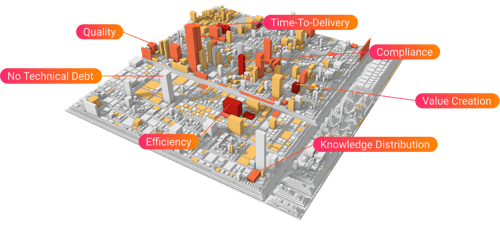
In this article, we'll delve into the ways artificial intelligence is currently deployed in software production, the challenges it faces, and the future role A.I. may play.
While software is undeniably becoming ever more critical in corporate value creation and in the formation strategic competitive advantage, its development is ineffectual and leaves much to be improved. Upwards of 80% of devoted resources go wasted as developers dedicate themselves to the time-consuming tasks of bug fixing, tech debt fighting, and other maintenance instead of the creation of new features. With in-house software development being the source of most important innovations for companies, this is an issue of upmost importance.
Even as software development becomes ever more critical, its looming challenges present a major headache for companies – one of the largest being the consistent dearth of highly skilled software developers, which is especially urgent in software-defined industries, such as automotive. This contributes to the fact that more than half of software projects are over budget and delivered late, with 20% failing entirely. Poor software quality costs firms hundreds of billions in dollars every year. Artificial intelligence won't fully solve these challenges, but can definitely alleviate some of the problems by augmenting developers' abilities and ensuring efficiency.
From start to finish, companies are utilizing artificial intelligence and machine learning to improve their software development processes.
While automated testing tools have existed for quite some time, a more recent innovation has been automated test cases designed by artificial intelligence. Artificial intelligence-powered tests can more thoroughly validate your software projects while detecting defects with greater speed and efficiency.
A.I. can also be used to detect and predict bugs early in the process. Defects become more expensive to repair later in the software lifecycle, not to mention the reputation-damaging effects of a major software defect.
Similar to the text completion features on Google Email or Microsoft Outlook, A.I. tools exist that can vastly improve the speed of coding by providing recommendations for completing lines of code. This can reduce the number of keystrokes by up to half.
With software process mining, the data traces automatically created in the process of software development are anonymously extracted, aggregated, and analyzed – regardless of projects' various programming languages. Through this, universal KPIs and software visualizations are created. Tech executives and managers can then measure and manage software projects with greater command. Moreover, they are able to identify the highest performing teams and spread their best practices throughout the organization. These KPIs and visualizations also enable teams to quickly pinpoint areas of code high in defects or technical debt and rectify the situation.

The quality of coding generally improves with the assistance of A.I., which decreases the likelihood of a security flaw. Moreover, artificial intelligence can be leveraged to detect anomalies in behavior and alert the appropriate authorities early, before a breach has caused too much damage.
Requirements management is the "process of documenting, analyzing, tracing, prioritizing and agreeing on requirements and then controlling change and communicating to relevant stakeholders." Natural language processing, a field of artificial intelligence, is deployed by some digital assistants to analyze requirements documents and recommend improvements. Such tools can identify ambiguities and other weaknesses, so that requirements review can be completed more effectively and efficiently.
While artificial intelligence won't be programming software autonomously any time soon, its applications within the field of software development will continue to expand, helping this highly complex and inefficient field to improve its efficiency and manageability. In the long term, artificial intelligence could make software development more democratic and accessible for the everyday person by simplifying it. Even if/when software engineering remains difficult for an untrained person, its use as an augmentation for skilled developers will only grow with time. For more information on how artificial intelligence is impacting various industries, read this article.
These Stories on News
August-Bebel-Str. 26-53
14482 Potsdam, Germany
hello@seerene.com
+49 (0) 331 706 234 0
Generative AI Seerene GmbH
August-Bebel-Str. 26-53
14482 Potsdam, Germany
hello@seerene.com
+49 331 7062340